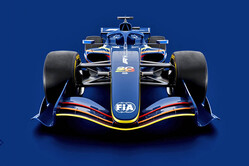 "The rules are evolving," insists the FIA's Single-Seater Director Nikolas Tombazis in reaction to drivers claims.
"The rules are evolving," insists the FIA's Single-Seater Director Nikolas Tombazis in reaction to drivers claims.
Following initial runs in the simulator, a number of drivers, most notably Max Verstappen and Charles Leclerc, have expressed concern at next year's regulations overhaul, the biggest in living memory.
One of the main concerns raised is that the new regs will require more focus on energy management and the like, as opposed to out and out racing.
"Obviously when you have a much bigger proportion of electrical power and a smaller proportion of ICE power, and you don't have batteries that are discharging over the entire race distance, then energy management becomes a bit more of a challenge," admits Tombazis to Motorsport.com.
"Now the opportunity of these new cars for the participating manufacturers is to develop the batteries, the electrical systems, and so on," he adds. "I think we will see some innovation on the electrical side of the engine next year, which I think will be good. But clearly there are some challenges with the energy management, and the noises that we hear are usually related to that.
"We haven't finished the rules yet in that respect," he insists. "The rules are evolving and we knew of these issues from day one. The moment you reduce one power, and you increase the other one, we knew that there were issues to address.
"We have to go through an approval process with the PU manufacturers," he explains in terms of the potential need for changes, "so we can't just unilaterally make a change tomorrow. But by and large, when we address specific problems, the teams and PU manufacturers tend to be relatively helpful.
"I think what we have now and what we'll have at the beginning of next year is not exactly the same thing," he admits. "I'm not saying it will be completely different, but there will definitely be a lot of evolution between now and the start.
"Obviously, one of the difficulties is that it isn't always easy to get everyone to agree," he admits. "When teams and manufacturers discuss these matters, they think of a combination of the good of the sport and their own competitive position.
"Of course, one bit influences the other, so unavoidably, there will be different opinions. At the moment, the technical specification of the engines, the electrical part, and all of that is set in stone. That's not changing."
Confirming that the FIA is still working on the energy recovery side of things, he says: "I think there's a general feeling that all of these topics will have very strong levers on which to react. Those things have to do with the maximum power, how quickly it will reduce on the straights, the energy that you can recover, etc. There are all sorts of levers that we can play on, and that we are playing on."
Asked about claims that drivers will need to lift and coast on the straights, something of which Verstappen has been highly vocal, Tombazis says: "There will be quite a lot of new provisions in order to manage the energy better and to make sure that cars are not decelerating on the straights, doing funny things, or, let's say, doing unnatural things.
"What we don't want, is a situation where they have to lift off, for example, on the straights or anything like that. We will absolutely, categorically, make sure that they don't have to lift off in a particular area in order to do something with the energy or whatever. When they need to go faster, drivers will keep the pedal to the metal, as they say."
Returning to the theme of manufacturers focussing on themselves, Tombazis admits that some are proving reluctant to share their initial data.
"Some are very secretive about what they're doing, while some others are very open and very helpful in proposing things," he admits. "We are taking a lot of those ideas on board."
As for the drivers concerns, he believes that much of this could stem from the fact that they don't yet have the full picture.
"I think it's important to convey that, because some people, including the drivers testing in the simulator, don't follow the evolution of our discussions with the teams in detail. Maybe they only get a snapshot. But the reason they're driving the simulator is precisely to identify these problems, so we can solve them.
"If we didn't have drivers in the simulator, we wouldn't have all this feedback. We can do quite a lot with simulations ourselves, but you actually need a driver in a car and get a lot of feedback. That's what is going on these months."






















sign in